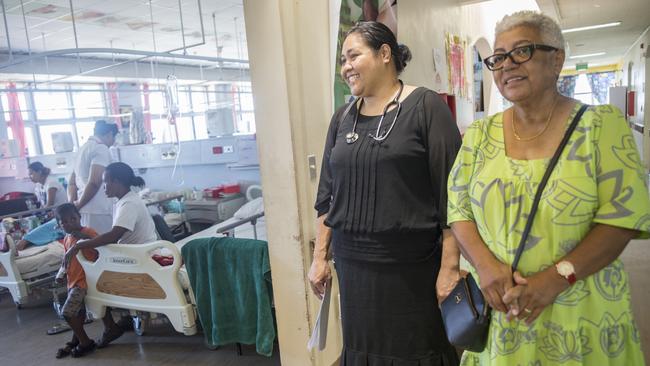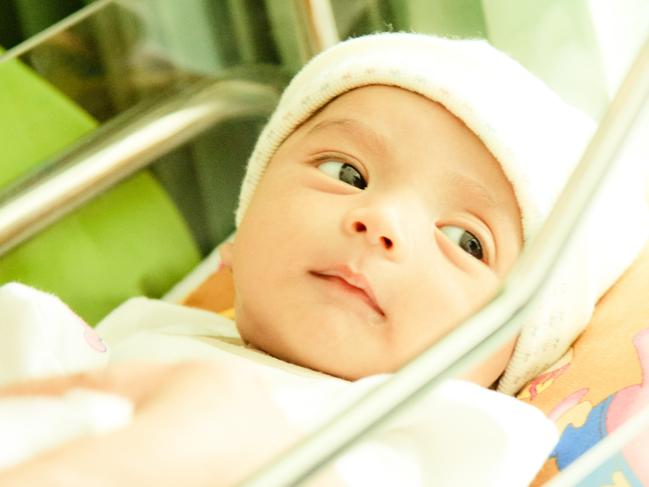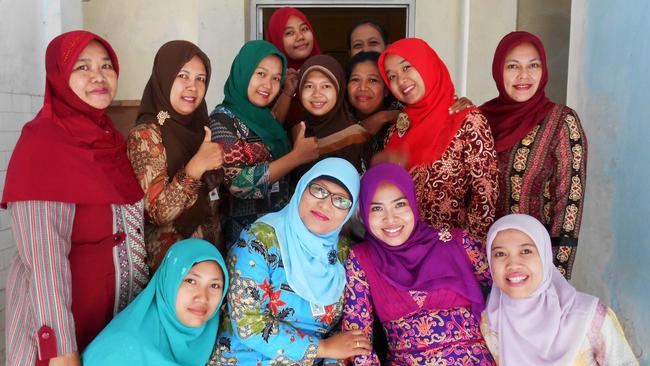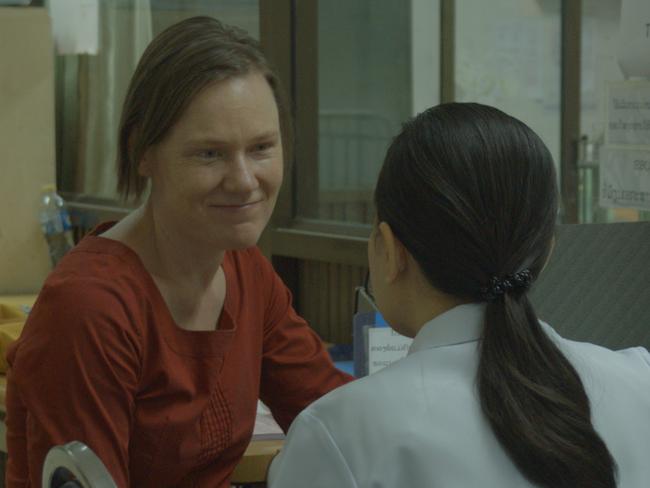Our health experts healing kids around the world
They’re on the ground in the most remote, needy and appreciative corners of the globe. Melbourne’s hero medics are quietly saving the world for Christmas — just as they do without fanfare every week.
VIC News
Don't miss out on the headlines from VIC News. Followed categories will be added to My News.
They’re on the ground in the most remote, needy and appreciative corners of the globe.
Melbourne’s hero medics are quietly saving the world for Christmas — just as they do without fanfare every week.
When at home in Parkville, many of our world-renowned child health experts occupy a single 1.6km stretch taking in Murdoch Children’s Research Institute, the Royal Children’s Hospital and the University of Melbourne.
But away from home, their real impact is too great to be measured in geography or the number of lives saved.
Spanning six continents and 23 countries, Parkville’s paediatric heroes are playing a very personal role in saving hundreds of thousands of children.
RCH TURNS TRAGEDIES INTO GIFTS OF LIFE
PROTON BEAM THERAPY CENTRE TO BE BUILT AT PARKVILLE
NIMA AND DAWA SEPARATED AT ROYAL CHILDREN’S HOSPITAL

A snapshot of their work leading up to Christmas sees Melbourne medics running projects providing oxygen in African hospitals; protecting Fijian children with the pneumococcal vaccine; cutting the mortality rate of Vietnamese premmies by 40 per cent; eliminating scabies across the Pacific and rewriting the medical books in Laos ... just to name a few.
The global good generated is about to increase following this week’s launch of Melbourne Children’s Global Health, formally bringing together the MCRI, RCH and University of Melbourne to expand and work with 45 low-resource countries to improve child and adolescent health.
The immediate impact will be massive. A new rotavirus vaccine invented here is set to be rolled out to millions of Indonesian children, firstly through a trial with the nation’s national vaccine company before its expected wider release in 2021.
Past — and current — experience proves how important the work is.

In 2016, Australia helped the Fijian government introduce vaccines to prevent diarrhoea, pneumonia, meningitis and cervical cancer, which is being rolled out and monitored by MCGH members.
In Laos, where the child mortality rate is six times higher than Australia, where 22 in every 1000 children born will not live beyond their fifth birthday, Prof Fiona Russell has overseen a program reversing the toll.
The program has cut serious pneumonia cases by 25 per cent and developed the proof needed to convince governments to invest in vaccines.
“That is why we do this — to stop kids getting sick and dying from the most common things,” Prof Russell said.
“The RCH is probably the best in the world but, when you come to countries like Laos and you know as a paediatrician what the standard of care could be, it is terrifying.
“As a parent, watching a child gasping and knowing that it can be prevented and the child should not be dying of this, is heartbreaking. That is the whole reason we get into this.”
FIGHTING FOR FIJI
Nearing the end of his medical training in the mid- 1990s, Prof Andrew Steer, now 46, visited Samoa.
He has shared his professional life between Melbourne and projects in Fiji, the Solomon Islands, Ethiopia, Samoa and Uganda.
“I was at a stage in my medical training where I was trying to find my way ... there were things that lit my fire about being in Samoa,” Prof Steer said.
“For many of us working in global health, there is a sense that we can do some simple things here to make major impacts on childhood health. It drives a lot of people, it drives me.”
Now an infectious disease expert at MCRI and RCH, Prof Steer has been fighting to rid the Pacific of scabies.
With Australian-backed mass drug administration trials providing the evidence to support on-ground programs, Prof Steer is seeing a huge impact on the parasitic disease that causes pain and suffering to more than 200 million people worldwide.

By taking ivermectin — a drug that earned its creators a Nobel Prize for its use combating other tropical diseases — and adapting it for use on scabies, workers were able to treat a population of more than 25,000 in Fiji while simultaneously combating the eye infection, trachoma.
“(This has) been working in communities where between 20-40 per cent of people living in the village had scabies,” Prof Steer said.
“We were able to give one round of treatment and come back 12 months later and see the number of people with scabies was less than 2 per cent.”
Prof Steer said he felt just as inspired when working in Parkville, amazed at the progress of colleagues, usually adapting medicines and health programs which are decades old in Australia, but adapted and stripped back to suit poorer areas.
“They are thinking laterally about the things we take for granted in Australia ... the idea is we are training people and doing these things to put ourselves out of a job.”
CARE FOR BABIES
Vietnamese doctor Hoang Tran, trained here, is using mostly Australian methods, to make a huge difference in her homeland.
After winning a University of Melbourne scholarship, Dr Tran did a research PhD at the RCH into ways she could reduce infant mortality.
The answers may seem simple, but the results have been stunning. After introducing her Kangaroo Mother Care in Da Nang, Dr Tran saw a 40 per cent cut in deaths among pre-term and underweight babies.
For years, she had seen Vietnamese hospitals pushing towards the use of ventilators, modern equipment and baby formula at the expense of fundamental care, with about 40 per cent of the 200,000 South East Asian newborn deaths occurring due to infections or lack of oxygen.

Rather than needing costly medical interventions, Dr Tran said simple, low-cost measures — like breastfeeding, resuscitation, keeping newborns warm, skin-to-skin contact and improved health worker hygiene — were the answer.
The hospital has also cut rates of hypothermia and asphyxia by almost a third, admissions to neonatal intensive units have dropped by 30 per cent, infection rates are down and newborn antibiotic use has been halved.
“Health professionals were too scared to leave them with their mothers, (they) also gave them formula instead of breast milk,” she said. “We focus on simple intervention but for many years, many countries forgot to do it.”
TEEN HEALTH
The University of Melbourne and MCRI’s Prof George Patton has celebrated huge success in overhauling one of the developing world’s most neglected areas — adolescent health.
But he said he and his colleagues were still struggling to find financial support.
“We believe what we are doing is making a contribution to making the world a better place,” Prof Patton said. “But it sometimes feels like we are doing that without an awful lot of support from government.”

Funding for foreign aid programs has halved since 2012, and Prof Patton said he was concerned not only for those needing help, but also for the opportunity Australia might miss.
“If you are able to paint a vision of the future, it would be of Melbourne as the technical centre of health in the Asia- Pacific region,” he said.
In the past fortnight, his work has been published in the prestigious Lancet medical journal, detailing remarkable results of a secondary school overhaul involving 25,000 students in India.
The work was based on 15-year-old Australian public health programs but largely funded by US government, UK backers and the Bill & Melinda Gates Foundation.
“There were stunning effects ... mental health improved out of sight, many other aspects of their sexual and reproductive health, their attitudes and behaviours changed, bullying and violence decreased — the effect was profound,” Prof Patton said.


